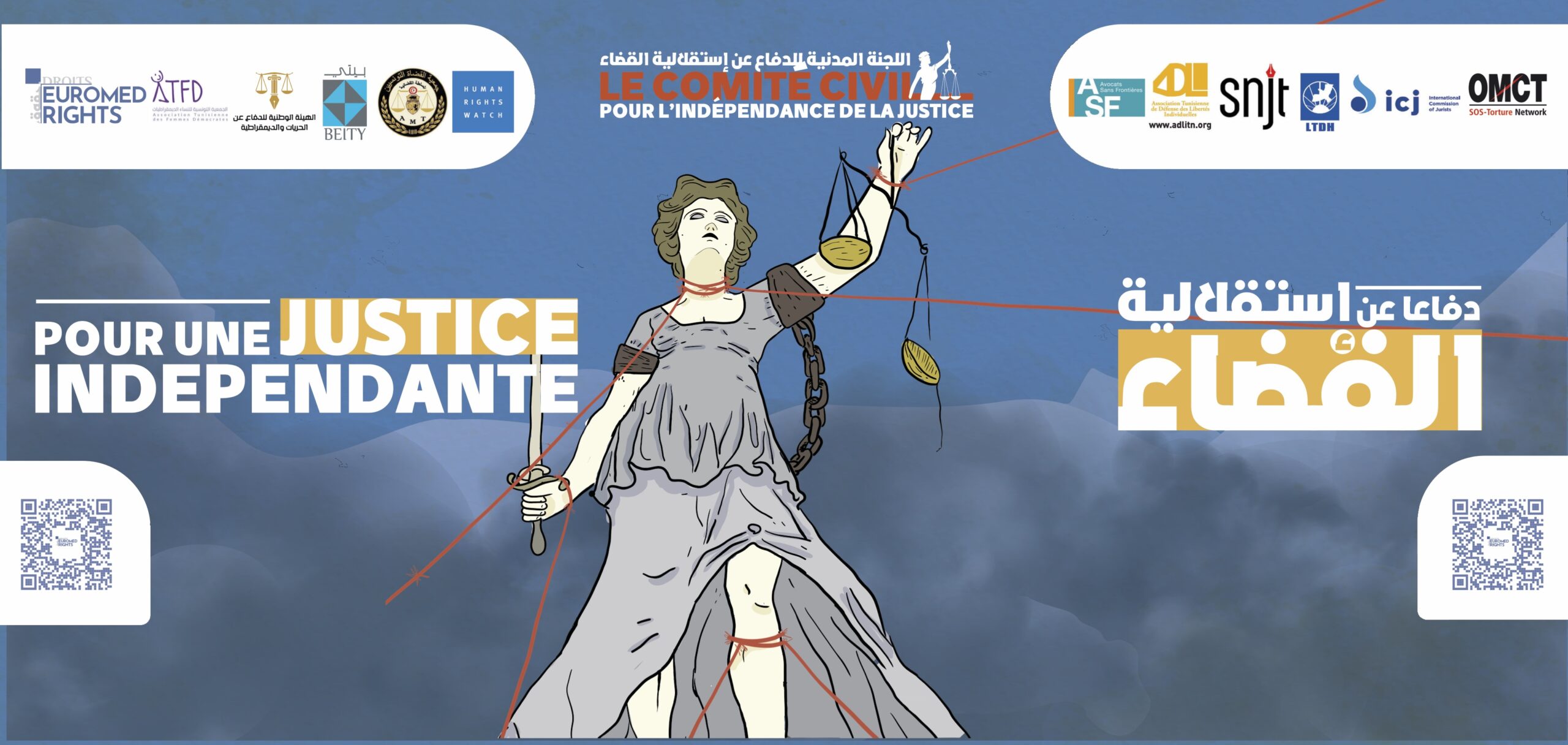Since President Kais Saied’s institutional power grab of July 25, 2021, followed by his decree of September 22 of the same year, which implicitly repealed the constitutional order, and the adoption of a tailor-made Constitution a year later, the judicial system has been subjected to constant attacks aimed at crushing its independence and sweeping away the right to a fair trial.
البيان باللغة العربية على هذا الرابط
Through Decree Law no. 2022-11 of February 12, 2022, the President of the Republic dissolved the elected High Judicial Council (HJC), a body established by the 2014 Constitution and supposed to guarantee the independence of the judiciary, and replaced it with a provisional Council, almost half of whose members are appointed directly by the president. On June 1, 2022, he proceeded to dismiss 57 judges, after granting himself the authority to do so through Decree Law no. 2022-35. The independence of the judiciary, guaranteed by an independent HJC which generations of activists and jurists had fought for, was thereby wiped out by the executive branch which had given itself the authority to revoke judges and prosecutors unilaterally, violating the right to a fair trial by an independent and impartial court.
In August 2022, in a case brought by some of the revoked judges, the president of the Administrative Court of Tunis ordered the suspension of the implementation of the revocation of 49 judges and their reintegration, on the grounds that, among other factors, their revocation was not based on any tangible evidence of serious misconduct. Yet to date, the government has refused to comply with this order. These moves to dismantle the independence of the judiciary were thus coupled with a blatant attack on the rule of law through the refusal to implement these judicial decisions. Worse still, the Ministry of Justice subsequently launched criminal prosecutions against the revoked judges and prosecutors, including in the judicial anti-terrorism unit, in an attempt to justify their dismissal retrospectively.
By turning the justice system into a “function” and no longer an autonomous “power”, the new Constitution, adopted through a referendum with less than a 30% turnout, ensures that the subjugation of the justice system is enshrined in the Fundamental Law. The new Constitution stripped the HJC of its substance and of its status as a constitutional body.
While the authorities have been escalating arbitrary arrests and baseless judicial prosecutions against critics of President Saied, the president has publicly warned “those who might disculpate” his opponents, whom he has himself described as “terrorists” on several occasions, that they would be considered “accomplices”. Given these barely veiled threats against it and the arbitrary dismissal of judges and prosecutors, the Tunisian justice system can no longer wholly fulfil its role as guarantor of fundamental freedoms and rights.
The signatories warn against the instrumentalization of the justice system that is dangerous for anyone who is answerable before the law, for whom an independent justice system remains the ultimate protection against arbitrary decisions and the sole guarantor of a fair trial.
The signatories therefore call for:
- The reinstatement of the revoked judges, in compliance with the August 2022 decisions of the president of the Administrative Court of Tunis;
- An end to interference by the executive in judicial cases;
- Respect for the fundamental right to a fair trial by an independent and impartial court;
- The repeal of Decree Law no. 2022-11 of February 12, 2022, amended by Decree Law no. 2022-35 of June 1, 2022; and
- Respect for international standards on the independence of the justice system and the right to a fair trial, in line with Tunisia’s international commitments.
Signatories:
International Non Governmental Organizations :
- Euromed Rights
- International Commission of Jurists (ICJ)
- Human Rights Watch (HRW)
- Avocats sans Frontières (ASF)
- Organisation Mondiale Contre la Torture (OMCT)
- Amnesty International
- Danner
Tunisian Civil Society Organizations:
- Civil Committee for the Independence of Justice
- Association of Tunisian Judges (AMT)
- Beity Association
- National Instance for the Defence of freedom and Democracy
- Tunisian Association for the Defence of Individual Freedoms (ADLI)
- Tunisian Forum for Economic and Social Rights (FTDES)
- Tunisian League for the Defence of Human Rights (LTDH)
- National Union of Tunisian Journalists (SNJT)
- Association Tunisienne des Femmes Démocrates (ATFD)
- Al Bawsala
- Association Al Kaíama for Rights and Freedom
- Association Citoyenneté et Libertés Djerba
- Association des familles des martyrs et blessés de la Révolution (Awfia)
- Association des femmes Pour la Citoyenneté et le Développement Jendouba
- Psychologue du Monde Tunisie
- Association Ensemble Pour La Citoyenneté et le Changement
- Association Ifeda
- Association JOUSSOUR de Citoyenneté
- Association Karama Tozeur
- Association Sawt Al Insen
- Association Voluntaries Bouarada
- Civil Coalition for the Defence of Transitional Justice
- Commission Nationale Pour les Militants de gauche
- Damj Tunisian Association for Justice and Equality
- No Peace Without Justice
- Legal Agenda
- Intersection Association For Rights and Freedoms
- Justice & Rehabilitation
- Civil Committee for the respect of Freedoms and Human Rights
- Mawjoudin Initiative
- Tunisian Network for Transitional Justice




